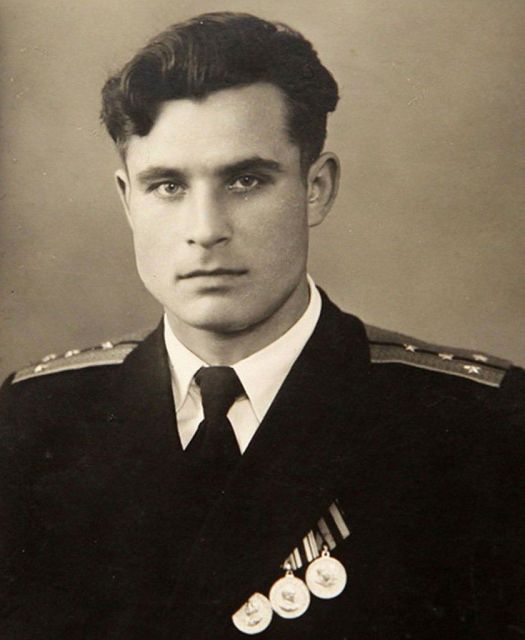
The latest single from London-based prog rock band, Hats Off Gentlemen It’s Adequate is taken from their eighth studio album The Uncertainty Principle due to be released later in 2024. It’s called One Word That Means The World (Vasily Arkhipov).
The band enjoy a high concept for their songs – their previous album The Light of Ancient Mistakes included songs on the Cold War, English MPs’ discovery of Hitler’s atrocities, and the miserable childhood of author John le Carré.
The new song is dedicated to the Soviet naval officer Vasily Arkhipov (pictured below). During the Cuban missile crisis in 1962, Arkhipov was onboard a B-59 submarine, part of a flotilla stationed near Cuba, hiding so deep in the sea that it hadn’t received radio signals from Moscow for several days. When the US Navy began to drop depth charges to try to force the submarine to the surface, the captain and the political officer, assuming that they were now at war with the US, made the decision to launch their T-5 nuclear torpedo. Arkhipov managed to persuade the others not to launch the nuclear weapon but to surface and obtain orders from Moscow. The submarine was then ordered to return to Soviet territory. Arguably, Arkhipov’s brave action saved the world from nuclear war – the simple Russian word ‘nyet’ (‘no’) was the ‘one word that means the world’.
Arkhipov’s clear-headed decision is even more remarkable for being taken in extreme physical conditions. The submarine’s batteries were failing; there was no air conditioning and the heat was extreme; high levels of carbon dioxide caused feelings of suffocation and panic. Yet on their return home the crew were treated as if they had let their country down, although Arkhipov did rise to the rank of vice admiral in the Soviet navy before he retired in 1988.

Vasily Arkhipov – Image courtesy of Olga Arkhipova
Arkhipov’s predicament is soon turned into a much wider existential crisis in the song’s lyrics which begin with specifics but soon widen to the haunting refrain,
We don’t know who we are till we’re forced to decide/We don’t know what’s inside
The song begins in medias res, with a spiky, slightly frenetic guitar solo, immediately evoking the claustrophobic setting, ‘trapped beneath the waves … The burning lifeless air…’ The sense of intense claustrophobia is enhanced by the octave doubling on the vocals, similar to the vocal effect on Pink Floyd’s ‘Welcome to the Machine’ from their 1975 album Wish You Were Here. There’s also a rising synth motif which has a similar tonal quality to the treated piano part at the opening of Echoes from Pink Floyd’s Meddle (1971), evoking the sonar from the submarine.

Malcolm Galloway and Mark Gatland
The doubling of the vocal line stops during the chorus, creating a more intimate feel, showing that the words ‘We don’t know who we are…’ are more personal to Arkhipov’s situation, whilst at the same time being of more universal relevance by using the word ‘we’ rather than addressing him directly. That changes again at the end of the chorus when Arkhipov is directly addressed with the poignant words, ‘That was the day when you said no.’
There’s a further shift in of point of view with the words ‘That was years ago, and now I’m told I’m a hero.’ We are now seeing events from Arkhipov’s perspective, and the vocals become more restrained and thoughtful. The point of view then switches to the universal ‘we’ and back to Arkhipov again in the first-person singular. There’s a powerful guitar solo, again suggesting the anguish Arkhipov must have suffered when making his decision. The song ends with Arkhipov’s poignant words, ‘I found out when I said no.’ It’s a fine song, a worthy and passionate tribute to a brave man. to whom the single is dedicated.
Personnel
Music by Malcolm Galloway and Mark Gatland
Lyrics by Malcolm Galloway
Malcolm Galloway – vocals, guitars, producer, mixing, mastering
Mark Gatland – bass guitar, co-producer, vocal engineer
Artwork by Malcolm Galloway, made with DALLE-3 (AI art) and Photoshop.
The B-side of the single is the instrumental ‘Music For Dancing’ – Written and performed by Malcolm Galloway (guitar, synths/keyboards, producer, mastering) and Mark Gatland (bass guitar, synths, co-producer).




